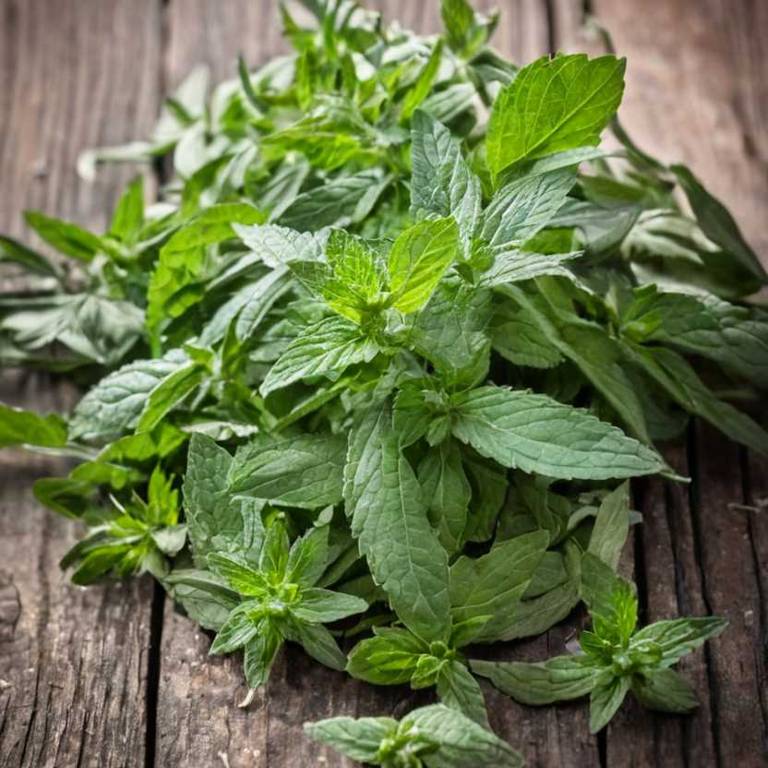10 Best Mentha Arvensis Preparations

The best medicinal preparations of Mentha arvensis are teas, decoctions, tinctures, essential oils, and syrups, each offering unique therapeutic benefits.
Teas made from fresh or dried leaves are commonly used to soothe digestive issues and promote relaxation.
Decoctions involve boiling the herb to extract its stronger compounds, often used for respiratory support.
Tinctures provide a concentrated form of the herb, ideal for addressing ailments like headaches and muscle pain.
Essential oils derived from Mentha arvensis are valued for their aromatic and analgesic properties, often used in aromatherapy and topical applications.
Syrups made from the herb are popular for their cooling effect and are used to relieve coughs and sore throats.
Below there's a list of the 10 best herbal preparations of mentha arvensis for medicinal purposes.
1. Teas
Mentha arvensis teas is commonly used to relieve digestive issues, reduce inflammation, and alleviate symptoms of respiratory conditions.
The most common medicinal uses of this herbal preparation include treating indigestion, nausea, headaches, and skin irritations. It is also used to soothe sore throats and ease menstrual cramps. The bioactive constituents responsible for its medicinal properties include menthol, menthone, and other essential oils that have antispasmodic, analgesic, and anti-inflammatory effects.
Additionally, flavonoids and phenolic compounds contribute to its antioxidant and antimicrobial properties.

2. Decoctions
Mentha arvensis decoctions is commonly used to relieve digestive issues, headaches, and respiratory conditions.
This herbal preparation is widely utilized for treating ailments such as indigestion, nausea, colds, and muscle pain. The most common medicinal uses include alleviating gastrointestinal discomfort and reducing inflammation. The bioactive constituents responsible for its medicinal properties include menthol, menthone, and various phenolic compounds.
These components contribute to its antispasmodic, analgesic, and antimicrobial effects.

3. Tinctures
Mentha arvensis tinctures is commonly used to treat digestive issues, headaches, and respiratory conditions.
These tinctures are often employed for alleviating symptoms of indigestion, nausea, and stomach cramps due to their carminative properties. They are also used to relieve sinus congestion and ease coughing by acting as a decongestant and expectorant. The bioactive constituents responsible for these effects include menthol, menthone, and pulegone, which have antispasmodic, analgesic, and anti-inflammatory properties.
Additionally, the presence of volatile oils and flavonoids contributes to its soothing and therapeutic effects on the body.

5. Syrups
Mentha arvensis syrups is commonly used to relieve symptoms of respiratory conditions, such as coughs, bronchitis, and sore throats, due to its soothing and expectorant properties.
These syrups are also used to treat digestive issues like indigestion and nausea, as they can help stimulate appetite and ease gastrointestinal discomfort. The most common medicinal uses include alleviating cold and flu symptoms, reducing inflammation, and providing a cooling effect to the body. The bioactive constituents responsible for these effects include menthol, menthone, and other volatile oils that have antispasmodic, analgesic, and antimicrobial properties.
Additionally, the presence of flavonoids and phenolic compounds contributes to its antioxidant and anti-inflammatory benefits.

6. Capsules
Mentha arvensis capsules is commonly used to relieve symptoms of digestive issues, headaches, and respiratory conditions.
The most common medicinal uses of this herbal preparation include treating indigestion, nausea, headaches, and coughs. It is also used to alleviate stress and promote mental clarity. The bioactive constituents responsible for its medicinal properties include menthol, menthone, and pulegone, which have antispasmodic, analgesic, and anti-inflammatory effects.
These compounds contribute to its effectiveness in soothing the digestive and respiratory systems.

7. Lozenges
Mentha arvensis lozenges is commonly used to relieve symptoms of sore throat, cough, and respiratory infections due to their cooling and soothing effects.
These lozenges are often employed to treat ailments such as inflammation of the throat, bronchitis, and other upper respiratory tract infections. The bioactive constituents responsible for these medicinal properties include menthol, menthone, and other volatile oils that have antimicrobial, anti-inflammatory, and analgesic effects. Additionally, the presence of flavonoids and phenolic compounds contributes to its antioxidant and immune-supporting benefits.
This herbal preparation is valued for its natural ability to provide symptomatic relief without the use of synthetic drugs.

8. Oils
Mentha arvensis oils is commonly used to relieve symptoms of digestive disorders, headaches, and respiratory issues.
The most common medicinal uses include treating indigestion, nausea, migraines, and inflammation. It is also used in aromatherapy to alleviate stress and improve mental clarity. The bioactive constituents responsible for its medicinal properties include menthol, menthone, and pulegone, which have cooling, antispasmodic, and analgesic effects.
These compounds contribute to its ability to soothe muscle pain, reduce fever, and promote relaxation.

9. Creams
Mentha arvensis creams is commonly used to relieve symptoms of skin irritations, muscle pain, and inflammation.
These creams are frequently applied for conditions such as eczema, psoriasis, and minor burns due to their soothing and anti-inflammatory properties. The most common medicinal uses include treating skin infections, reducing swelling, and alleviating pain from injuries or arthritis. The bioactive constituents responsible for these effects include menthol, limonene, and various phenolic compounds, which have cooling, antimicrobial, and analgesic properties.
These components work together to provide therapeutic benefits for a range of ailments.

10. Linctuses
Mentha arvensis linctuses is commonly used to relieve symptoms of respiratory tract infections, such as coughs, bronchitis, and sore throats.
This herbal preparation is known for its soothing and expectorant properties, making it effective in loosening mucus and reducing irritation in the throat. The most common medicinal uses include treating coughs, colds, and inflammation of the respiratory system. Bioactive constituents such as menthol, menthone, and pulegone contribute to its medicinal properties by providing antispasmodic, analgesic, and anti-inflammatory effects.
These compounds help in reducing coughing spasms and easing breathing difficulties.
